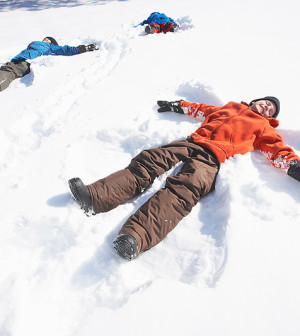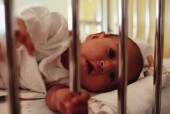- Could Your Grocery Store Meat Be Causing Recurring UTIs?
- Are You Making This Expensive Thermostat Error This Winter?
- Recognizing the Signs of Hypothyroidism
- 10 Strategies to Overcome Insomnia
- Could Artificial Sweeteners Be Aging the Brain Faster?
- Techniques for Soothing Your Nervous System
- Does the Water in Your House Smell Funny? Here’s Why
- Can a Daily Dose of Apple Cider Vinegar Actually Aid Weight Loss?
- 6 Health Beverages That Can Actually Spike Your Blood Sugar
- Treatment Options for Social Anxiety Disorder
Bed-Sharing Linked to SIDS


Risk factors for sudden infant death syndrome (SIDS) appear to change with the age of the infant, researchers say.
They found that younger babies are more likely to die when they’re sharing beds, while older babies face a higher risk of sudden death when there are objects in the crib with them, such as pillows and toys.
“This study is the first to show that the risks during sleep may be different for infants of different ages,” said lead author Dr. Rachel Moon, associate chief of Children’s National Medical Center’s division of general pediatrics and community health, in Washington, D.C. “Parents of infants under 4 months of age should be aware that bed-sharing is a huge risk factor.”
Parents should also be careful to make sure their infants sleep without objects around them, she said.
“Parents often forget that as the infant gets older and nothing bad has happened,” Moon said. “We need to re-emphasize that the sleep environment needs to be clear even as the infant gets older, particularly as the infant becomes more mobile.”
Although this study found an association between bed-sharing or having objects in the crib and sudden infant death, the study can’t prove that these factors actually caused the deaths of the children.
And, Moon noted it would be impossible to do such a study. “We can never do a randomized, controlled trial — put some babies on their stomachs for sleep and other babies on their backs for sleep, and see what happens,” Moon said. “That would be unethical.”
More than 2,000 babies died of sudden infant death syndrome in 2010 in the United States, the latest year for which statistics are available, according to the U.S. National Institutes of Health. Ninety percent of the deaths occurred in babies less than 6 months old, although SIDS and related conditions can strike anytime in the first year.
In the new study, researchers sought to understand how the most common risk factors affect babies of various ages. To find the answer, they examined more than 8,000 infant deaths from sleep-related causes from 24 states for the period from 2004 to 2012.
Almost 70 percent of the deaths occurred in babies who were sharing a bed at the time of their death, the study found. An object, such as a blanket or a pillow, was found in babies’ beds in about one-third of the deaths.
The babies who died before 4 months of age were most likely to have been sharing a bed. To a lesser extent, they were also more likely to be in an adult bed or sleeping on a person.
Young babies don’t have the ability to move their heads or bodies to avoid being suffocated when another person moves in the same bed, according to the study.
Older babies — between 4 months and a year — were somewhat more likely to have slept with an object like a pillow, blanket or stuffed animal. “The most dangerous objects are the soft, cushiony objects — pillows, bumper pads, blankets, etc.,” Moon said. “They increase risk for SIDS and are also associated with accidental suffocation. We recommend that nothing be in the crib except for the baby.”
The older babies were also somewhat more likely to have rolled onto their back from their side or front. Medical officials advise parents to put babies to sleep on their backs and not sleep with them on beds or couches.
More research is needed into SIDS, said Rosemary Horne, a SIDS specialist and deputy director of the Ritchie Center at Monash Medical Center’s MIMR-PHI Institute of Medical Research in Melbourne, Australia.
“More studies need to be done to identify why parents are ignoring safe sleeping advice,” she said. “Is it because of poverty and they simply have no safe place for their baby to sleep, or is it because they are receiving incorrect advice from their parents, family members or medical professionals?”
The study was published online July 14 and in the August print issue of Pediatrics.
More information
For more about preventing SIDS, visit the American Lung Association.
Source: HealthDay
Copyright © 2026 HealthDay. All rights reserved.










